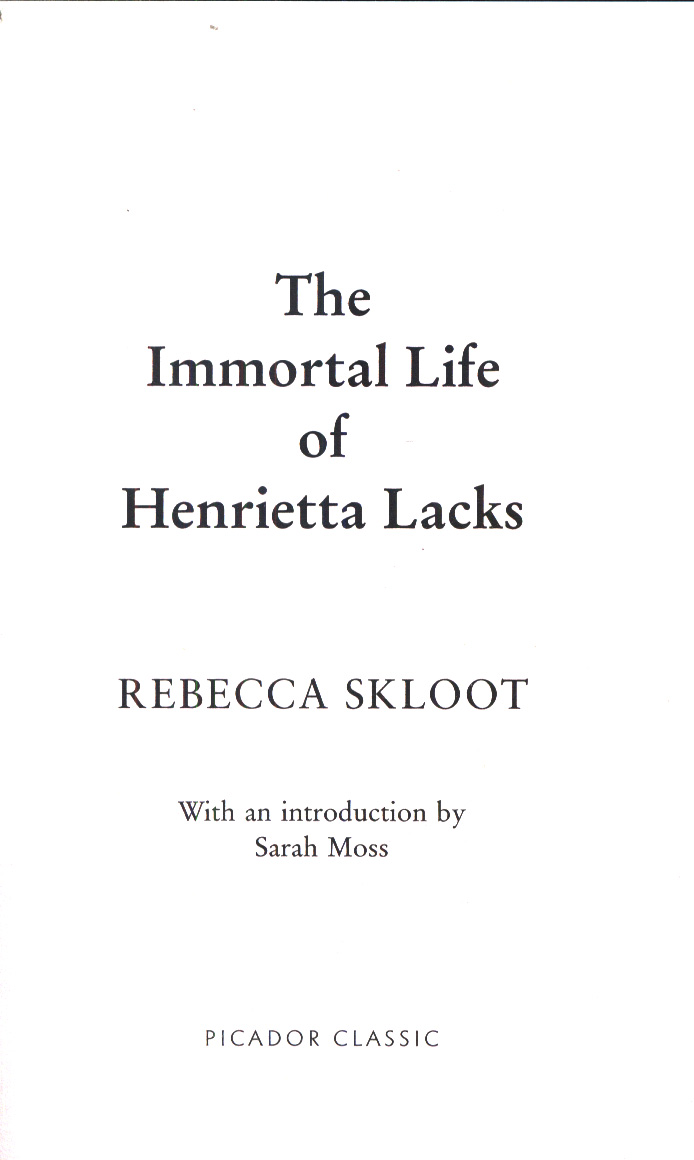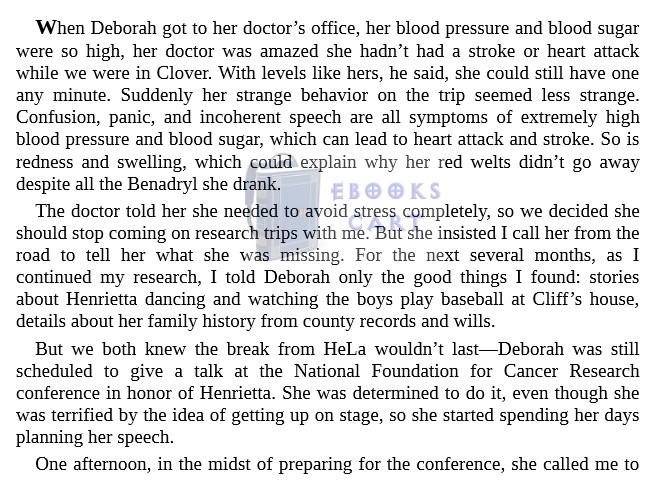

In the 1950s, patient consent was not required for sample collection or use, so it’s doubtful that Henrietta ever knew about the extra procedure.įrom the point of view of a scientist, this is where the book really became interesting to me. While Henrietta was unconscious, about to undergo her first treatment where radioactive radium was packed into her vagina to deliver ionizing radiation directly to her cervix, two dime-sized slices of tissue were excised from the tumour and sent to the lab of Dr. The book documents a fascinating tale of historic doctor-patient relationships and ethics. An autopsy performed following her death showed that her very aggressive cancer had metastasized to practically every organ in her body. Henrietta died on October 4, 1951, a scant eight and a half months later. She underwent the current cancer treatments of the day, but, in the end, they proved unsuccessful. Henrietta was diagnosed with cervical cancer at Johns Hopkins Hospital in Baltimore when she was only 31 years old. They had five children together, the last being born only four months before her diagnosis. Henrietta and David had their first child together when Henrietta was 14 and they later married when she was 21.

Henrietta was raised by her grandfather, alongside David Lacks, her first cousin. After her mother died in 1924 while giving birth to her tenth child, Henrietta and her siblings moved to Clover, Virginia, where they were split up amongst different members of the family. Henrietta was born in 1920 to poor parents in Roanoke, Virginia. It tells the dual-track stories of Henrietta Lacks through the 1940s and 1950s, and her family through the 1990s and early 2000s, mostly through the experiences of Henrietta’s youngest daughter, Deborah. The Immortal Life of Henrietta Lacks was one of the top non-fiction books of 2010 and was awarded the 2011 Best Book Award by the National Academies of Science. Jenny was curious about my impressions of this book, both from the standpoint of someone who writes science for the layperson, but also as someone who has personally worked with HeLa cells. Following the post on the recovery of Tsar Nicolas II and his family, Jenny and I had a discussion about The Immortal Life of Henrietta Lacks, the narrative non-fiction retelling of Henrietta Lacks’ life and the immortal cell line, HeLa, that arose from her cervical tumor. While the material I tend to talk about has more to do with forensics, science and history, this particular review came as a suggestion by one of my crit team members. HeLa alternative assignment due – If you did not read the book you can replace the final project but the quizzes and reviews will count against your grade.When I first started this blog, I have to admit that I never thought to do book reviews. Why is this story important? What is the lesson for today?Ī Family Consents 62 years later – NYTimes You got to remember, times was different.” Is it possible to approach history from an objective point of view? If so, how and why is this important, especially in the context of Henrietta’s story? Consider Deborah’s comment on page 276: “Like I’m always telling my brothers, if you gonna go into history, you can’t do it with a hate attitude. Visual Slideshow – 250 words of text with at least 8 pictures to support your opinion based on evidence from the text. Traditional – 500 word opinion essay based on evidence from the book ( about 2 pages) Analyze the story as a hero journey with Skloot as the hero, and then change your perspective and analyze the story with Deborah as the hero. The narrative arc involving Deborah and Skloot follows that of an archetypal hero journey. What are the risks and benefits of allowing profit to guide research? What are the obstacles involved with conducting research purely for altruistic reasons? Examine the often contradictory forces of altruism and profit as they influenced research related to HeLa. Using the book as a guide, describe the process of scientific inquiry. Should patient consent be required to store and distribute their tissue for research? Should doctors disclose their financial interests? Would this make any difference in achieving fairness? Or is this not a matter of fairness or an ethical issue to begin with? Part 2 Due 02/05 Content Quiz/Seminar Discussion Part 3 Due 02/12. Part 1 due 01/29,- Content Quiz/Seminar Discussion.

The Immortal Life of Henrietta Lacks – Rebecca Skloot (2010.)


 0 kommentar(er)
0 kommentar(er)
